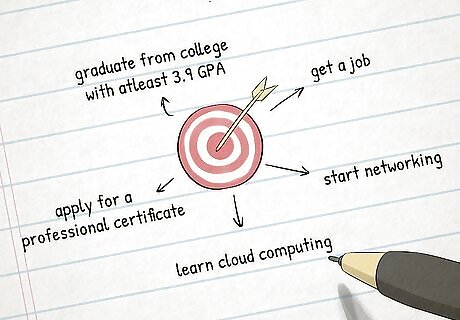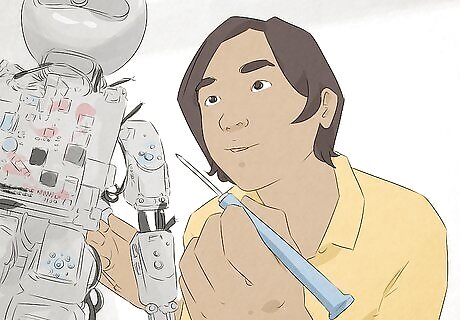
views
Read a lot.

The best way to learn without getting a formal education is to read a lot. Read as much as you can at every opportunity. This, in and of itself, can make you a scholar (since a scholar is really just someone who is learning all the time). You can read books that you buy, but don't forget that you can also go to your local library and get loads of books for free! The internet has made lots of library systems much easier to use, letting you find, order, and renew books right from your home. There are also loads of books in the public domain, which you can get free digital copies of to keep. Project Gutenberg is the most famous, but you can also get many through Amazon's Kindle program.
Teach yourself.

You can teach yourself new skills and information as well. Humans learn by doing, so get out there and do! You can teach yourself from books or other materials, or you can learn by really just doing things. Just make sure not to hurt yourself! This can often take a lot of determination but you can do it! Don't give up!
Try online schools.

Many new online schools with free classes are springing up all over the web. You can take classes from top universities, and some are even working towards offering certificates of completion. You can learn all sorts of skills and topics, from history to computer programming. Popular options include Coursera, CreativeLive, OpenCulture, or even Mental Floss' Youtube Series (featuring John Green!). Try using College Board or Khan Academy to help you learn common subjects or to prepare for the SAT or ACT. You can also learn languages online for free. Good sites include LiveMocha, Duolingo, and the Foreign Service Institute's online resources.
Learn more than one language.

Speaking a language is not only helpful for you in your life, it also is often a requirement for degrees! Show a college that you're ready by learning a language. Choose a language that will be useful, as choosing an non-useful one doesn't really entice a college as much. Some languages are more useful than others in certain regions or for certain degrees. You can take lessons privately, at your school, at a local college, or for free online! Good online options include LiveMocha and DuoLingo. Skills in 1 or 2 foreign languages may be helpful as well, in order to read older scientific papers that haven't been translated into English. The most helpful languages to learn include French, German, Spanish, Italian, Latin and Russian. You may need to learn Arabic, Persian and Turkish. Many scientists and scholars have passed in Arabian Peninsula, Southeast Asia, Ottoman Empire and Persia (Present day Iran).
Question everything.

Real scholars question everything they hear or read. They never take information at face value, and try to make sure the information that they're working with is true. If something seems off, it just might be! Even things that seem right may be wrong, so make sure you're working with the facts.
Fully form opinions.

Take in all sides of an argument and as much information as you can before forming an opinion. Come to your opinions on your own, rather than taking them from someone else. This is an important skill for scholars.
Change your mind.

Scholars have to be willing to change their mind when they get new information that challenges their previous views. This is one of the most important skills for a scholar. Be open minded and willing to be wrong, in the pursuit of being right.
Avoid bias.

Don't let your personal feelings inform your actions or the information that you give to others. Just because you don't agree with something doesn't make it not true. Give all information a chance and don't let your bias color your conclusions.
Take classes.

Did you know that you can take classes without trying to get a degree? If you're interested in learning a particular skill or about a particular subject, you can take classes in just that, without the cost of an entire degree. Some classes may even be free. Talk to your local community college about auditing classes (this means taking the class but not doing any of the homework or tests and not getting credit or a grade). You can also talk directly to the professor and try to work something out between the two of you.
Learn from other people.

You can also learn lots of skills and subjects just by talking with and learning from someone who is an expert. This is called apprenticing. Find someone that does what you want to learn how to do, and offer to pay them or provide a free helping hand if they'll show you what to do. This works better for skills than academic subjects, but you might still be able to find someone sympathetic enough to recommend some good books or other ways to learn.
Spread the knowledge you have.

Write articles, papers, books and/or give lectures about your own field of knowledge like other great authors and scientists. You will write articles for journals, papers for conferences,and essays and books for publishing. The hope is that your original research will be significant enough to gain notoriety for the university you work for, attracting more students and grants. When you work in academia, you will usually be required to continue researching in your field, writing papers and books at regular intervals. Sometimes you will be allowed to take a sabbatical, or a paid, year-long break in order to work on your research.
Do more than the minimum level of schoolwork.

Doing just the minimum isn't going to impress anyone, so get out there and put in some hard effort. Take extra classes, audit classes at the local community college while you are still in high school, or work (either for money or volunteering) outside of school. It will help you a lot if the extra work you do relates to the degree you want to get in college. This will look promising to colleges you apply to.
Get good grades.

It is important to get good grades in high school (or your country's equivalent), especially during the last two years. Colleges and universities will be looking at these grades to decide whether or not to let you in. Get good grades by studying, paying attention in class, and doing all your work. Get extra help from your teachers and communicate with them often if you want to help boost your grade.
Get good test scores.

Getting good SAT (or equivalent) scores will make a huge difference in what schools you are able to get in to. Get better scores to get in to better schools. Get good scores by studying ahead of time (well in advance of your test date) and take practice tests. You can also take the test more than once if you want to. Don't feel like getting a bad or average score will keep you from doing the things you want. You can always start at one college and transfer to a better one. Set up a quiet study area without any electronics or distractions so you're able to focus.
Have specific goals in school.

If you know what you want a degree in from the beginning of your time in college, this will help you a lot. Knowing what you want allows you to take only classes that will help you, rather than fluff classes that get you nowhere. Use your time in high school, if you can, to decide what you want to study and do with your life. Getting experience in that field by volunteering can really help you figure things out. It's okay to change your mind of course, this can just really help.
Spend time studying.

Study as much as you can and get good grades in order to get the most out of your time in college. Taking notes and paying attention in class will go a long way towards helping you learn. Get good at these skills if you really want to succeed. You can study on your own or with other people. Whatever works best for you. Working with others, however, allows you to take advantage of their notes. Get help when you need it. You can ask your classmates, make use of the tutoring center, or you can get help from your professor or the TA.
Befriend your professors.

Befriending your professors is about more than getting a better grade because they like you more. You professors can often be your ticket into a good grad school, and they may be your colleagues later in your career. Get to know them by taking advantage of office hours. However, be sure you aren't wasting their time. Come in with actual questions and pay attention to what they say. You can also get to know your professors by being engaged in class. Sit near the front, answer and ask questions, and be good about participating in general. You can also just talk to them and ask for advice. They want to see you succeed and should be more than happy to give you some pro tips about working and getting ahead in the field.
Get all of your necessary degrees.

For some academics, a master's degree is enough to do what they want to do. Some will need to get a PhD. This means that if you really want to spend the rest of your life as a scholar, you'll need to go to graduate school. Keep in mind that all of your schooling together can be 8 years or more after high school! Doctoral programs take about 6 years to complete after obtaining a bachelor's degree. This may includes time used for earning a master's degree and completing a dissertation. Don't get scared about this though. Graduate school is very different than normal school and, in some ways, it's easier. If you can get in, you can probably handle it.
Stay on top of the latest research in your field.

You should be reading publications in your field every day -- which shouldn't be too difficult if you have a true passion for that area (and if you don't, you may want to reconsider becoming a professor for that subject). You need to continually expand your specialized knowledge in that field if you want to become a good professor. Things can change from what's printed in the textbooks, and you want to be able to share that information with your students. It's better not to be one step behind your students and peers. Networking with the experts in your field will also bolster your own research endeavors.
Attend conferences.

Conferences are special gatherings of lots of scholars in a particular field. They get together to present their research and learn from each other. You may present things that you've been studying but mostly you'll listen to the presentations of others and talk with your colleagues. Some conferences may be local or regional, but sometimes you may get to go to international conferences. Believe us, conferences are more fun than what they sounds like. Realistically, most are just a bunch of scholars getting drunk together.
Study psychology and philosophy.

You will need to study psychology because you might have to deal with difficult people so by this you will understand people's nature. By studying philosophy your mind capability will expand. You will be able to think a lot more than before.
Do postdoctoral research.

If you want a faculty position at a research-oriented or PhD-granting university, typically you will need to do at least one postdoctoral fellowship after completing your PhD. During this time, typically 2-4 yrs, you will need to publish as many papers as you can in the top ranked journals of your discipline.
Teach classes.

This means that you will have to talk in front of other people. Sometimes it will be a very large number of people, if you're teaching large freshman lecture classes. Don't be intimidated though. You'll get practice in teaching classes while you are in graduate school, and your department should provide you with lots of help. Your students are also probably more nervous then you are, since they want you to give them good grades!
Do other scholarly activities.

The whole time that you are in school, you can take part in a wide variety of scholarly activities that excite your mind and let you have fun. You can read for fun and explore your own research interests. You can even do group activities, if you're more of a people person, like joining the debate team.
Be curious.

Scholars are people who are naturally curious. They want to know everything! You should be naturally curious too, and always try to find out how and why things work the way they do.
Love learning.

Scholars love to learn about everything. They enjoy the act of learning itself, not being smarter than other people or knowing more facts. It's not a party trick: it's what really makes them happy!
Keep learning.

Real scholars spend their entire lives learning. Just because you finished school doesn't mean that you'll stop. Continue to read in your spare time. This usually means reading academic journals, since this is where you'll be able to keep up with the latest developments in your field. Travel to study in other countries. For many fields, it may be beneficial to take trips overseas, to see what your colleagues in other countries are working on or to gain access to materials that you may not have where you live. Try getting other degrees. Sometimes scholars will go back to school and get degrees. This is often so that they can get further in their career, or if their research area overlaps with another field.



















Comments
0 comment